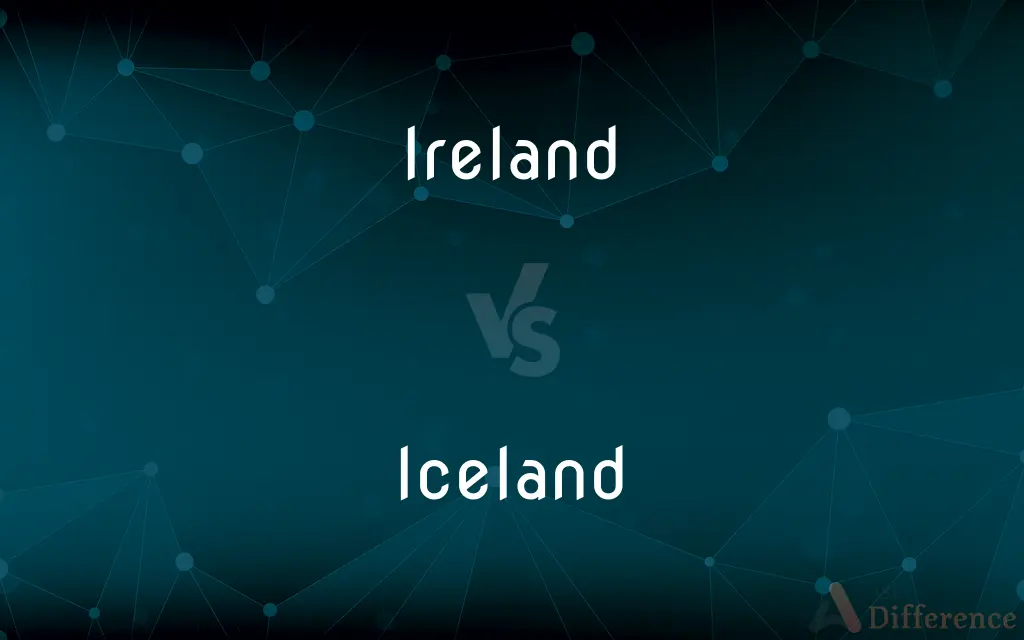Ireland vs. Iceland — What's the Difference?
By Tayyaba Rehman & Fiza Rafique — Updated on April 19, 2024
Ireland is known for its lush green landscape and historic Celtic culture, while Iceland is famous for its dramatic volcanic terrain and strong Norse heritage.

Difference Between Ireland and Iceland
Table of Contents
ADVERTISEMENT
Key Differences
Ireland, often called the Emerald Isle due to its verdant landscapes, boasts a rich history influenced by Celtic traditions. On the other hand, Iceland, known as the Land of Fire and Ice, features rugged landscapes shaped by volcanic activity. Both countries have distinct cultural identities deeply rooted in their historical and geographical contexts.
The climate of Ireland is temperate maritime, characterized by mild winters and cool summers, heavily influenced by the Atlantic Ocean. Whereas, Iceland experiences a subarctic climate, where the weather can vary dramatically from one day to the next, with relatively mild winters and cool summers due to the moderating effect of the North Atlantic Current.
Ireland's economy is significantly driven by technology, pharmaceuticals, and finance, reflecting its integration into the global market. Meanwhile, Iceland's economy relies heavily on fishing, geothermal and hydroelectric power, indicating a focus on natural resources and sustainability.
In terms of population density, Ireland is considerably more populated, with a diverse demographic spread across its cities and rural areas. Conversely, Iceland has one of the lowest population densities in Europe, with most of its population concentrated in and around the capital, Reykjavik.
Tourism in Ireland is fueled by its castles, coasts, and cultural festivals that draw visitors seeking historical and natural beauty. Iceland attracts tourists with its unique geothermal spas, northern lights, and landscapes that offer otherworldly and stark natural beauty.
ADVERTISEMENT
Comparison Chart
Landscape
Lush green, rolling hills
Volcanic, rugged terrain
Climate
Temperate maritime
Subarctic, with mild influences
Economy
Technology, pharmaceuticals
Fishing, geothermal power
Population Density
Higher, varied across regions
Lower, concentrated around capital
Tourism
Castles, coasts, cultural events
Geothermal spas, northern lights
Compare with Definitions
Ireland
A country in northwest Europe known for its historic castles and vibrant cultural festivals.
Ireland's St. Patrick's Day parades attract tourists worldwide.
Iceland
An island nation in the North Atlantic known for its dramatic volcanic landscapes.
Iceland's terrain features everything from lava fields to glaciers.
Ireland
Ireland features a temperate maritime climate, fostering lush landscapes.
The mild Irish weather supports the growth of thick green grasses.
Iceland
Heavily reliant on renewable energy sources, particularly geothermal power.
Iceland's heating needs are largely met by geothermal energy.
Ireland
The Irish economy is robust, with significant contributions from the tech sector.
Many global tech firms have European headquarters in Ireland.
Iceland
The majority of Iceland's population lives near Reykjavik.
Reykjavik is known for its vibrant arts scene and nightlife.
Ireland
Known for its literature and folklore, Ireland has a rich storytelling tradition.
Irish folklore is filled with tales of leprechauns and fairies.
Iceland
Icelandic culture is influenced by Norse history and sagas.
The Sagas of Icelanders are key historical texts that capture early Icelandic life.
Ireland
Ireland's population is concentrated in Dublin, its largest city and capital.
Dublin is a bustling metropolis known for its historical and cultural significance.
Iceland
Iceland experiences a subarctic climate that influences its unique ecosystems.
Despite its northern location, Iceland's climate is moderated by the Gulf Stream.
Ireland
Ireland ( (listen) YRE-lənd; Irish: Éire [ˈeːɾʲə] (listen); Ulster-Scots: Airlann [ˈɑːrlən]) is an island in the North Atlantic. It is separated from Great Britain to its east by the North Channel, the Irish Sea, and St George's Channel.
Iceland
Iceland (Icelandic: Ísland; [ˈistlant] (listen)) is a Nordic island country in the North Atlantic Ocean and the most sparsely populated country in Europe. The capital and largest city is Reykjavík.
Ireland
A republic consisting of 26 of 32 counties comprising the island of Ireland; achieved independence from the United Kingdom in 1921
Iceland
A land or region of icy terrain.
Ireland
An island comprising the republic of Ireland and Northern Ireland
Iceland
An island republic on the island of Iceland; became independent of Denmark in 1944
Iceland
A volcanic island in the North Atlantic near the Arctic Circle
Common Curiosities
What is the primary difference between the landscapes of Ireland and Iceland?
Ireland is characterized by green rolling hills and traditional landscapes, while Iceland features dramatic volcanic formations and stark vistas.
How do the climates of Ireland and Iceland compare?
Ireland has a temperate maritime climate with mild temperatures year-round, whereas Iceland's subarctic climate brings more extreme weather variations.
What are the economic focuses of Ireland and Iceland?
Ireland's economy is driven by technology and pharmaceuticals, while Iceland focuses on sustainable resources like fishing and geothermal energy.
How does the geographic isolation of Iceland affect its culture?
Iceland's geographic isolation has helped preserve its Norse heritage and influences much of its cultural and social norms.
How do the educational systems in Ireland and Iceland compare?
Both countries offer high standards of education, but Ireland has more tertiary educational institutions per capita.
Which country has a higher population density, Ireland or Iceland?
Ireland has a higher population density compared to Iceland, which is one of the least densely populated in Europe.
What type of tourism is prevalent in Ireland compared to Iceland?
Ireland is known for cultural tourism including castles and festivals, while Iceland is popular for its natural attractions like geothermal spas and the northern lights.
What are the cultural influences of Ireland and Iceland?
Ireland's culture is deeply influenced by Celtic traditions, whereas Icelandic culture has strong Norse roots.
What is the significance of folklore in Irish culture?
Folklore plays a central role in Ireland, preserving historical narratives and enriching the cultural heritage.
What impact does the climate have on the natural beauty of Ireland and Iceland?
The climates of both countries enhance their natural beauty; Ireland's climate supports lush vegetation, while Iceland's climate sustains unique geological features.
What role does renewable energy play in Iceland's economy?
Renewable energy, particularly geothermal power, plays a significant role in Iceland's economy and energy strategy.
How do the capitals of Ireland and Iceland differ in terms of cultural offerings?
Dublin, Ireland's capital, is rich in historical and cultural attractions, while Reykjavik, Iceland's capital, is noted for its modern arts and music scene.
How does the literary tradition of Ireland compare to that of Iceland?
Ireland's literary tradition includes famous writers like James Joyce and W.B. Yeats, focusing on novelistic and poetic formats, whereas Iceland's tradition is renowned for medieval sagas and epic tales.
How do Ireland and Iceland manage their natural resources?
Ireland manages its agricultural and technological resources to boost its economy, while Iceland leverages its natural resources, especially renewable energy, for sustainability and economic stability.
Which country has a greater variety of ecosystems, Ireland or Iceland?
Iceland has a greater variety of ecosystems, from glaciers and volcanoes to geothermal areas, owing to its unique geological activity.
Share Your Discovery

Previous Comparison
Unnormal vs. Normal
Next Comparison
Watching vs. WatchedAuthor Spotlight
Written by
Tayyaba RehmanTayyaba Rehman is a distinguished writer, currently serving as a primary contributor to askdifference.com. As a researcher in semantics and etymology, Tayyaba's passion for the complexity of languages and their distinctions has found a perfect home on the platform. Tayyaba delves into the intricacies of language, distinguishing between commonly confused words and phrases, thereby providing clarity for readers worldwide.
Co-written by
Fiza RafiqueFiza Rafique is a skilled content writer at AskDifference.com, where she meticulously refines and enhances written pieces. Drawing from her vast editorial expertise, Fiza ensures clarity, accuracy, and precision in every article. Passionate about language, she continually seeks to elevate the quality of content for readers worldwide.














































